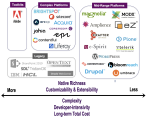Facebook Likes...to take your web content
You may have noticed Facebook "Like" buttons spring up everywhere on the web the past few months (including at the bottom of this post). You can now "Like" anything from blog posts to companies. How is this going to affect your Web Content Management (WCM) efforts?
I'm not going to get into the details of how to add the button -- there are plenty of tutorials on that. Suffice it to say you can either use a simple iFrame, or go all the way using FBML and a Facebook application. The end result will look something like this: click the button below to "Like" the Real Story Group website.
You can do a lot more with the button:
- The "Like" buttons we now append to each blog post will actually like the individual post, not the entire website
- You could make these part of an application; you'd be able to get stats on how well-liked your articles, products, or posts are
- You could also, then, start pushing similar content to Facebook users that liked your content
However, as my colleague Tony Byrne observed, "just because you can, doesn't mean you should." Certainly, when visitors like your content, that means more exposure. But it also means more exposure outside of the context of your website.
In a sense, this is a natural progression from RSS syndication. On this blog, we're well aware that many of our readers don't necessarily visit our site -- they get the content in their feed readers, without our carefully crafted design. (We publish the whole posts in the RSS, not just the abstracts.) That's fine, since we don't make money on advertising around our content -- instead, we're advertising our content.
But obviously, not everybody is pleased with this new reality. Rupert Murdoch is waging a battle with Google "taking his news for nothing." And yesterday, the NYT demanded the Pulse application be pulled from Apple's App Store, since it pulled in NYT content and published it in a different context (the Pulse app).
But even if you're fine with everyone indexing, liking, and retweeting your content, you may not like what happens around it. You might want to see what people are saying about your content, wherever it is they're saying it. You may want to enforce strict rules on how your content looks when it is presented. You may want to add context to it.
To Facebook, of course, it's not so much your content that has value, but the relationships between people and their likes. This becomes part of their Social Graph (which has little to do with graphs, but is all about mapping social networks). There are a couple of sites that make use of Facebook's API to show you what your friends like (such as Like Button). This gives some sense of what kind of information Facebook is gathering. If there's anything Facebook itself likes, it's becoming the central hub of all of these relationships. And of course, so would Google, Twitter, Yahoo, LinkedIn, and many others.
In effect, this means your carefully crafted online publication is under your control, but not your content. As soon as you publish it, it rides off into the sunset, and it may, or may not, live happily ever after. Be careful not to imagine your websites as some sort of non-linear books, nicely bound in leather and sent to known subscribers. If you still want to use paper as an analogy, imagine it as a stack of sheets blowing away in the wind on a busy street. It's going to be difficult to manage that experience.
Of course, these aren't physical pages, and there are many ways to trace them, regroup, and stack them. But it's important to think about the mechanics of content flows across the internet, instead of just pushing out your publication.
Facebook's "Likes" might be a good place to start finding out what that's going to mean for your Web CMS, and perhaps more importantly, for the content you're managing. Traditional content management concepts like "placeless" content, canonical templates, and the separation of content and presentation now take on a much broader meaning. Our tools and our content will need to adapt.








